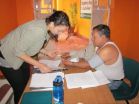(Press-News.org) ANN ARBOR, Mich. — Hypertension is one of the greatest epidemics threatening the health of people in low and middle-income countries.
For patients struggling with high blood pressure in countries with limited access to health care, the key to improving health may be as simple as a phone call.
New University of Michigan research evaluated the impact of automated calls from a U.S.-based server to the mobile phones of patients with hypertension (high blood pressure) in Honduras and Mexico. The program was designed to be a low-cost way of providing long distance checkups and self-management education.
Patients were provided with home blood pressure monitors and reported information about their blood pressure, medication use and symptoms during the weekly automated calls. During the calls, they received tailored health information from U-M via a cloud computing system.
Compared to patients receiving usual care, those who received the weekly 12-minute calls for six weeks were more likely to say that they understood how to take their medication, experienced fewer depressive symptoms and were more satisfied with care. Blood pressures decreased significantly, especially among patients with the greatest need for education about their hypertension management.
"What some people may not realize is that the biggest health threats in less-developed countries aren't just communicable diseases like HIV. Chronic disease and high blood pressure are the biggest killers," says lead author John D. Piette, Ph.D., professor of internal medicine at the U-M Medical School.
"Our work shows that mobile technology can be used to help people living in poor areas of the world that don't have the infrastructure for health services. It was gratifying to see how something based at U-M could give these patients in remote areas information they needed to manage their hypertension."
The results were published in Telemedicine and e-Health.
Despite high poverty levels in both Honduras and Mexico, up to 70 percent of the population has a cell phone – making it an instrumental tool to improve access to health monitoring and information, Piette says. The telehealthcare model had the most successful outcomes among people who had limited literacy – averaging just six years of formal education – and who lived on an average income of $2,900 a year.
Hypertension is a leading cause of the global epidemic of cardiovascular diseases and is a top health issue in Latin America where more than 100 million adults are hypertensive and rates among men are the highest in the world. Two-thirds of people with high blood pressure live in low and middle income countries.
"Our work provides evidence that this model of telehealthcare can deliver meaningful services to patients in remote areas of the world lacking access to health services," says Piette, who is also senior research scientist with the Veterans Affairs Ann Arbor Healthcare System. "We hope to further study how this model helps with other conditions such as diabetes or depression."
INFORMATION:
Additional Authors: Hema Datwani, M.P.H.; Sofia Gaudioso, M.P.H..; Stephanie M. Foster, M.P.H.., Joslyn Westphal, M.P.H..; William Perry, M.P.H..;; and Nicolle Marinec, M.P.H., all of U-M. Joel Rodríguez-Saldana, M.D., of the Remedi Medical Research and Development, Pachuca, Mexico. Milton O. Mendoza-Avelares, M.D., of the Yojoa International Medical Center, Santa Cruz de Yojoa, Honduras.
Funding: Funding for data collection, data analysis, and implementation of the automated telephone hypertension management system was provided by the following units of the University of Michigan: School of Public Health, Global REACH, and Center for Global Health. Home blood pressure monitors were donated by OMRONTM.
Disclosures: None
Citation: "Hypertension Management using Mobile Technology and Home Blood Pressure Monitoring: Results of a Randomized Trial in Two Low/Middle-Income Countries," Telemedicine and e-Health, doi:10.1089/tmj.2011.0271.
Automated calls help patients in under-developed countries manage blood pressure, U-M study finds
Hypertensive patients had lower blood pressures, fewer depressive symptoms, and fewer medication problems following automated calls advising self-care
2012-10-31
ELSE PRESS RELEASES FROM THIS DATE:
Single protein targeted as the root biological cause of several childhood psychiatric disorders
2012-10-31
A new research discovery has the potential to revolutionize the biological understanding of some childhood psychiatric disorders. Specifically, scientists have found that when a single protein involved in brain development, called "SRGAP3," is malformed, it causes problems in the brain functioning of mice that cause symptoms that are similar to some mental health and neurological disorders in children. Because this protein has similar functions in humans, it may represent a "missing link" for several disorders that are part of an illness spectrum. In addition, it offers ...
Testosterone regulates solo song of tropical birds
2012-10-31
This press release is available in German.
In male songbirds of the temperate zone, the concentration of sex hormones is rising in spring, which leads to an increase in song activity during the breeding season. In the tropics, there has been little evidence so far about such a clear relationship between hormonal action and behaviour, which is partly due to a lower degree of seasonal changes of the environment. Researchers of the Max Planck Institute for Ornithology in Seewiesen have now discovered that in duetting African white-browed sparrow weavers, the solo song of ...
For New York Times readers, fairness matters when it comes to paying for content
2012-10-31
New Rochelle, NY, October 31, 2012—In a paper published today by Cyberpsychology, Behavior, and Social Networking, a peer-reviewed journal from Mary Ann Liebert, Inc., publishers, researchers found that New York Times readers who were led to believe the newspaper's paywall was motivated by financial need were generally supportive and willing to pay, while those who believed it was motivated by profit were generally unsupportive and unwilling to pay. The article "Paying for What Was Free: Lessons from the New York Times Paywall," written by Jonathan Cook, Associate Research ...
Do clinicians and patients have same definition of remission from depression?
2012-10-31
PROVIDENCE, R.I. – Rhode Island Hospital researcher Mark Zimmerman, M.D., director of outpatient psychiatry, has found that patients suffering from major depressive disorder (MDD) define remission from depression differently than clinicians. While many psychiatrists and clinicians view remission from a symptom-based standpoint, the study found that patients put much more emphasis on life satisfaction and sense of well-being than on actual symptoms. The paper is published online in advance of print in the Journal of Psychiatric Research.
"Current standards for treating ...
RI Hospital: Near-complete blood flow restoration critical for best outcomes in stroke
2012-10-31
PROVIDENCE, R.I. – Two Rhode Island Hospital researchers recently found that restoring near-complete blood flow to the brain is necessary to restore or preserve neurological function following stroke. Seems like a no-brainer, right?
Yet until their research was complete, many physicians and researchers believed that partial blood-flow restoration was good enough. Not anymore.
The study by Mahesh Jayaraman, M.D., director of interventional neuroradiology, and Brian Silver, M.D., director of the Comprehensive Stroke Center at Rhode Island Hospital, is published online ...
Causation warps our perception of time
2012-10-31
You push a button to call the elevator to your floor and you wait for what seems like forever, thinking it must be broken. When your friend pushes the button, the elevator appears within 10 seconds. "She must have the magic touch," you say to yourself. This episode reflects what philosophers and psychological scientists call "temporal binding": Events that occur close to one another in time and space are sometimes "bound" together and we perceive them as meaningful episodes.
New research published in Psychological Science, a journal of the Association for Psychological ...
UMSOM dean urges caution in revising diagnostic guidelines for gestational diabetes
2012-10-31
A number of important questions and issues should be addressed before changes are made to the guidelines for the diagnosis of gestational diabetes, according to a new article by University of Maryland School of Medicine Dean E. Albert Reece, M.D., Ph.D., M.B.A., published online in the American Journal of Obstetrics and Gynecology on Oct. 31. The article publishes in advance of a new National Institutes of Health (NIH) initiative to reconsider diagnostic guidelines for the condition.
The NIH Office of Disease Prevention has called a Consensus Development Conference in ...
New inhibitors of elusive enzymes promise to be valuable scientific tools
2012-10-31
LA JOLLA, CA – October 31, 2012 – Scientists at The Scripps Research Institute (TSRI) have discovered the first selective inhibitors of an important set of enzymes. The new inhibitors, and chemical probes based on them, now can be used to study the functions of enzymes known as diacylglycerol lipases (DAGL), their products, and the pathways they regulate. Early tests in mouse macrophages suggest that DAGL-inhibiting compounds might also have therapeutic uses, for they suppress the production of a pro-inflammatory molecule that has been implicated in rheumatoid arthritis ...
Chronic kidney disease increases risk of death at all ages
2012-10-31
A new study from the Johns Hopkins Bloomberg School of Public Health and the Chronic Kidney Disease Prognosis Consortium found that chronic kidney disease and its complications were associated with a higher risk of death regardless of age. The findings were presented October 30 at the American Society of Nephrology conference in San Diego, Ca. and published in latest issue of JAMA.
Chronic kidney disease prevalence increases dramatically with age from 4 percent at age 20-39 to 54 percent of adults over age 75 in the populations studied. This led some groups to question ...
Breakfast sandwich is a time bomb in a bun
2012-10-31
Eat a breakfast sandwich and your body will be feeling the ill effects well before lunch – now that's fast food!
High-fat diets are associated with developing atherosclerosis (narrowing of the arteries) over a lifetime. But how quickly can damage start?
Just one day of eating a fat-laden breakfast sandwich – processed cheese and meat on a bun – and "your blood vessels become unhappy," says Heart and Stroke Foundation researcher Dr. Todd Anderson, director of the Libin Cardiovascular Institute of Alberta and head of cardiac science at the University of Calgary.
Atherosclerosis ...
LAST 30 PRESS RELEASES:
SfN announces Early Career Policy Ambassadors Class of 2026
Spiritual practices strongly associated with reduced risk for hazardous alcohol and drug use
Novel vaccine protects against C. diff disease and recurrence
An “electrical” circadian clock balances growth between shoots and roots
Largest study of rare skin cancer in Mexican patients shows its more complex than previously thought
Colonists dredged away Sydney’s natural oyster reefs. Now science knows how best to restore them.
Joint and independent associations of gestational diabetes and depression with childhood obesity
Spirituality and harmful or hazardous alcohol and other drug use
New plastic material could solve energy storage challenge, researchers report
Mapping protein production in brain cells yields new insights for brain disease
Exposing a hidden anchor for HIV replication
Can Europe be climate-neutral by 2050? New monitor tracks the pace of the energy transition
Major heart attack study reveals ‘survival paradox’: Frail men at higher risk of death than women despite better treatment
Medicare patients get different stroke care depending on plan, analysis reveals
Polyploidy-induced senescence may drive aging, tissue repair, and cancer risk
Study shows that treating patients with lifestyle medicine may help reduce clinician burnout
Experimental and numerical framework for acoustic streaming prediction in mid-air phased arrays
Ancestral motif enables broad DNA binding by NIN, a master regulator of rhizobial symbiosis
Macrophage immune cells need constant reminders to retain memories of prior infections
Ultra-endurance running may accelerate aging and breakdown of red blood cells
Ancient mind-body practice proven to lower blood pressure in clinical trial
SwRI to create advanced Product Lifecycle Management system for the Air Force
Natural selection operates on multiple levels, comprehensive review of scientific studies shows
Developing a national research program on liquid metals for fusion
AI-powered ECG could help guide lifelong heart monitoring for patients with repaired tetralogy of fallot
Global shark bites return to average in 2025, with a smaller proportion in the United States
Millions are unaware of heart risks that don’t start in the heart
What freezing plants in blocks of ice can tell us about the future of Svalbard’s plant communities
A new vascularized tissueoid-on-a-chip model for liver regeneration and transplant rejection
Augmented reality menus may help restaurants attract more customers, improve brand perceptions
[Press-News.org] Automated calls help patients in under-developed countries manage blood pressure, U-M study findsHypertensive patients had lower blood pressures, fewer depressive symptoms, and fewer medication problems following automated calls advising self-care



